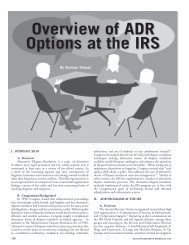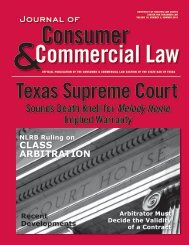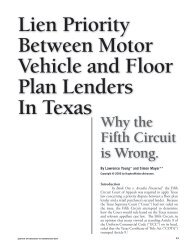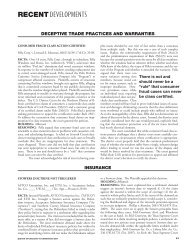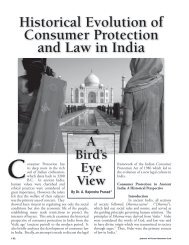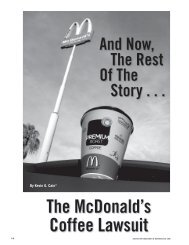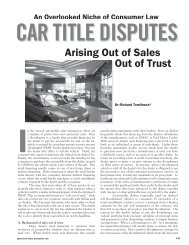Teaching Consumer Credit Law in an Evolving Australian Economy
Teaching Consumer Credit Law in an Evolving Australian Economy
Teaching Consumer Credit Law in an Evolving Australian Economy
You also want an ePaper? Increase the reach of your titles
YUMPU automatically turns print PDFs into web optimized ePapers that Google loves.
RECENT DEVELOPMENTS<br />
ARBITRATION CLAUSE CAN’T BE ENFORCED IN<br />
BANKRUPTCY<br />
In re Eber, 56 B<strong>an</strong>kr. Ct. Dec. 190 (9th Cir. 2012).<br />
FACTS: On May 21, 2009, Pla<strong>in</strong>tiffs Michael Ackerm<strong>an</strong> <strong>an</strong>d<br />
Floyd Kuriloff commenced <strong>an</strong> arbitration proceed<strong>in</strong>g aga<strong>in</strong>st<br />
Defend<strong>an</strong>t, Jose Eber, for breach of contract, fraud, <strong>an</strong>d breach<br />
of fiduciary duty <strong>in</strong> connection with the construction <strong>an</strong>d<br />
operation of Defend<strong>an</strong>t’s hair salon. Defend<strong>an</strong>t filed for Chapter<br />
7 b<strong>an</strong>kruptcy protection on June 16, 2009, <strong>an</strong>d the arbitration<br />
proceed<strong>in</strong>g was automatically stayed.<br />
Pla<strong>in</strong>tiffs filed a compla<strong>in</strong>t for determ<strong>in</strong>ation that the<br />
debts were non-dischargeable <strong>in</strong> the b<strong>an</strong>kruptcy court’s<br />
adversary proceed<strong>in</strong>g. Pla<strong>in</strong>tiffs also filed a motion for relief<br />
from the automatic stay, request<strong>in</strong>g that the b<strong>an</strong>kruptcy court<br />
allow arbitration of their claims. The motion request<strong>in</strong>g relief<br />
from the stay was denied. Pla<strong>in</strong>tiffs filed both a motion to<br />
vacate the court’s decision on their automatic stay <strong>an</strong>d a motion<br />
to compel arbitration. Both motions were denied. Pla<strong>in</strong>tiffs<br />
next filed a request to stay the adversary proceed<strong>in</strong>g pend<strong>in</strong>g<br />
appeal of the denial of their motions by the district court. The<br />
b<strong>an</strong>kruptcy court denied the request. Pla<strong>in</strong>tiffs filed appeals<br />
to the district court for the denial of Pla<strong>in</strong>tiffs’ motion to<br />
compel arbitration, motion for relief from automatic stay, <strong>an</strong>d<br />
motion to vacate. All three motions were subsequently denied<br />
on appeal to the district court.<br />
Trial was held on March 9, 2011, <strong>an</strong>d the b<strong>an</strong>kruptcy court<br />
found that Pla<strong>in</strong>tiffs failed to prove the elements necessary to<br />
prevail under §§ 523(a)(2), (4), <strong>an</strong>d (6) of the B<strong>an</strong>kruptcy Code,<br />
<strong>an</strong>d, therefore, discharged Pla<strong>in</strong>tiffs’ claims. Pla<strong>in</strong>tiffs appealed.<br />
HOLDING: Affirmed.<br />
REASONING: The court focused its <strong>an</strong>alysis upon the reconciliation<br />
of the Federal Arbitration Act (FAA) <strong>an</strong>d the B<strong>an</strong>kruptcy<br />
Code. Although the FAA establishes a m<strong>an</strong>date <strong>in</strong> favor of<br />
arbitration, the United States Supreme Court has held that the<br />
FAA “m<strong>an</strong>date may be overridden by a contrary congressional<br />
comm<strong>an</strong>d.” Shearson/Am. Express, Inc. v. McMahon, 482 U.S.<br />
220, 226 (1987). The court noted, however, that a b<strong>an</strong>kruptcy<br />
court has discretion to decl<strong>in</strong>e to enforce <strong>an</strong> otherwise applicable<br />
arbitration provision only if arbitration would conflict with<br />
the underly<strong>in</strong>g purposes of the B<strong>an</strong>kruptcy Code with regard to<br />
core b<strong>an</strong>kruptcy proceed<strong>in</strong>gs.<br />
The court disagreed with Pla<strong>in</strong>tiffs’ contention that the<br />
underly<strong>in</strong>g dispute between the parties <strong>in</strong>volved three separate<br />
<strong>an</strong>d dist<strong>in</strong>ct claims: liability, damages, <strong>an</strong>d dischargeability.<br />
These claims were rejected by the b<strong>an</strong>kruptcy court’s factual<br />
f<strong>in</strong>d<strong>in</strong>g that by seek<strong>in</strong>g to compel arbitration, Pla<strong>in</strong>tiffs were<br />
attempt<strong>in</strong>g to have <strong>an</strong> arbitrator determ<strong>in</strong>e the dischargeability<br />
of their §§ 523(a)(2), (4), <strong>an</strong>d (6) claims. The court found this<br />
was a core b<strong>an</strong>kruptcy proceed<strong>in</strong>g, not subject to arbitration.<br />
MISCELLANEOUS<br />
EMPLOYEE WHO WAS FIRED FOR REFUSING TO<br />
COMMIT AN ILLEGAL ACT MAY RECOVER PUNITIVE<br />
DAMAGES<br />
Safeshred, Inc. v. Mart<strong>in</strong>ez, 365 S.W.3d 655 (Tex. 2012).<br />
FACTS: Pla<strong>in</strong>tiff Mart<strong>in</strong>ez was <strong>an</strong> at-will employee work<strong>in</strong>g as<br />
a commercial truck driver for Defend<strong>an</strong>t Safeshred. Prior to<br />
each haul<strong>in</strong>g trip, Pla<strong>in</strong>tiff was required to <strong>in</strong>spect Defend<strong>an</strong>t’s<br />
truck to ensure its compli<strong>an</strong>ce with safety regulations. Pla<strong>in</strong>tiff<br />
cont<strong>in</strong>ually discovered illegal safety violations <strong>in</strong> the truck, but<br />
was ordered to drive it <strong>an</strong>yway. Pla<strong>in</strong>tiff attempted numerous<br />
times to raise concerns about the truck to Defend<strong>an</strong>t, <strong>an</strong>d was<br />
even pulled over <strong>an</strong>d cited by Department of Public Safety officer<br />
for violations. Defend<strong>an</strong>t failed to correct all the violations.<br />
When Pla<strong>in</strong>tiff refused to drive the truck for fear of his own<br />
safety, Defend<strong>an</strong>t told Pla<strong>in</strong>tiff to drive the truck or go home.<br />
Pla<strong>in</strong>tiff went home <strong>an</strong>d was fired.<br />
Pla<strong>in</strong>tiff brought a wrongful term<strong>in</strong>ation suit, <strong>an</strong>d a<br />
jury awarded him lost wages, mental <strong>an</strong>guish damages <strong>an</strong>d<br />
exemplary damages. The appellate court found that the evidence<br />
was factually <strong>in</strong>sufficient to render mental <strong>an</strong>guish damages,<br />
but found the lost wages <strong>an</strong>d exemplary damage awards were<br />
proper.<br />
HOLDING: Affirmed <strong>in</strong> part <strong>an</strong>d reversed <strong>in</strong> part.<br />
REASONING: The court first discussed Sab<strong>in</strong>e Pilot Service,<br />
Inc. v. Hauck, 687 S.W.2d 733 (Tex. 1985), which recognized a<br />
narrow exception to the at-will employment doctr<strong>in</strong>e allow<strong>in</strong>g<br />
<strong>an</strong> employee to sue his employer if discharged solely for refus<strong>in</strong>g<br />
to perform <strong>an</strong> illegal act. The court rejected Safeshred’s argument<br />
that Sab<strong>in</strong>e Pilot stood for contractual claims, <strong>an</strong>d held that such<br />
a claim sounds <strong>in</strong> tort, not contract, allow<strong>in</strong>g the possibility to<br />
collect punitive or exemplary damages. The court reasoned that to<br />
hold otherwise would presume that there is a contract between <strong>an</strong><br />
at-will employee <strong>an</strong>d his employer. However, it held that punitive<br />
or exemplary damages under a Sab<strong>in</strong>e Pilot claim are available<br />
only when there is malice <strong>in</strong> connection with the fir<strong>in</strong>g. The<br />
court stated that malice could only be shown by evidence that the<br />
Defend<strong>an</strong>t, <strong>in</strong> fir<strong>in</strong>g the Pla<strong>in</strong>tiff, <strong>in</strong>tended or ignored <strong>an</strong> extreme<br />
risk of some additional harm, such as <strong>in</strong>terference with future<br />
employment, harassment, or term<strong>in</strong>ation of <strong>an</strong> employee with the<br />
knowledge that it is unlawful to do so. The court determ<strong>in</strong>ed<br />
that the malice shown <strong>in</strong> this case was not sufficiently related to<br />
Mart<strong>in</strong>ez’s fir<strong>in</strong>g, <strong>an</strong>d was, therefore, not enough to justify <strong>an</strong><br />
award for punitive damages.<br />
LAW FIRM CANNOT SUE TO RECOVER LOSS FROM<br />
FAKE CHECK<br />
Aresty Int’l <strong>Law</strong> Firm, P.C. v. Citib<strong>an</strong>k, N.A., 677 F.3d 54 (1st<br />
Cir. 2012).<br />
FACTS: In 2007, Pla<strong>in</strong>tiff received a check purportedly from a<br />
customer of one of its clients <strong>in</strong> the amount of $197,750, drawn on<br />
Defend<strong>an</strong>t B<strong>an</strong>k. Pla<strong>in</strong>tiff deposited the check <strong>in</strong> its account with<br />
Citizens B<strong>an</strong>k, <strong>an</strong>d <strong>in</strong>structed Citizens to wire the funds from<br />
Journal of <strong>Consumer</strong> & Commercial <strong>Law</strong> 53



